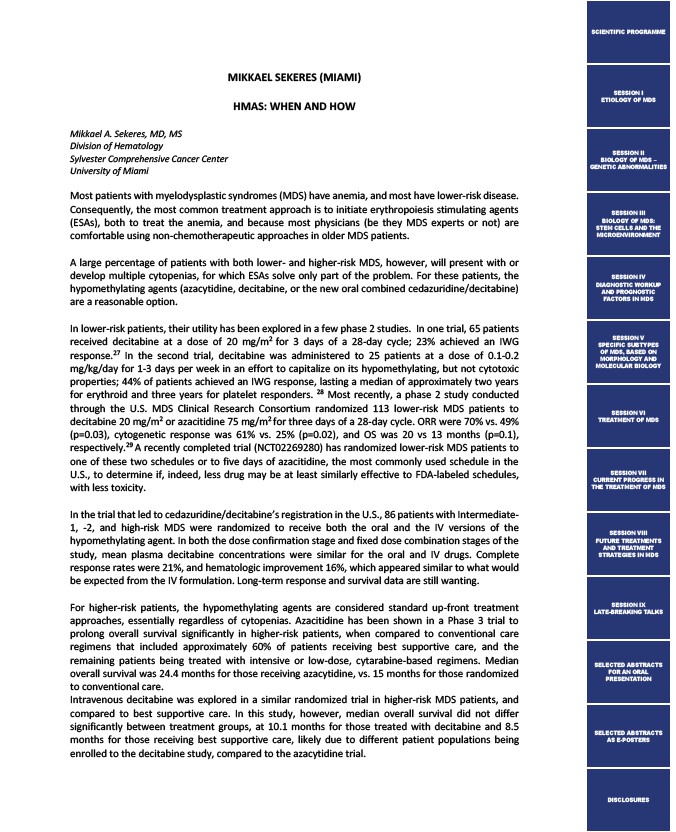
MIKKAEL SEKERES (MIAMI)
HMAS: WHEN AND HOW
Mikkael A. Sekeres, MD, MS
Division of Hematology
Sylvester Comprehensive Cancer Center
University of Miami
Most patients with myelodysplastic syndromes (MDS) have anemia, and most have lower-risk disease.
Consequently, the most common treatment approach is to initiate erythropoiesis stimulating agents
(ESAs), both to treat the anemia, and because most physicians (be they MDS experts or not) are
comfortable using non-chemotherapeutic approaches in older MDS patients.
A large percentage of patients with both lower- and higher-risk MDS, however, will present with or
develop multiple cytopenias, for which ESAs solve only part of the problem. For these patients, the
hypomethylating agents (azacytidine, decitabine, or the new oral combined cedazuridine/decitabine)
are a reasonable option.
In lower-risk patients, their utility has been explored in a few phase 2 studies. In one trial, 65 patients
received decitabine at a dose of 20 mg/m2 for 3 days of a 28-day cycle; 23% achieved an IWG
response.27 In the second trial, decitabine was administered to 25 patients at a dose of 0.1-0.2
mg/kg/day for 1-3 days per week in an effort to capitalize on its hypomethylating, but not cytotoxic
properties; 44% of patients achieved an IWG response, lasting a median of approximately two years
for erythroid and three years for platelet responders. 28 Most recently, a phase 2 study conducted
through the U.S. MDS Clinical Research Consortium randomized 113 lower-risk MDS patients to
decitabine 20 mg/m2 or azacitidine 75 mg/m2 for three days of a 28-day cycle. ORR were 70% vs. 49%
(p=0.03), cytogenetic response was 61% vs. 25% (p=0.02), and OS was 20 vs 13 months (p=0.1),
respectively.29 A recently completed trial (NCT02269280) has randomized lower-risk MDS patients to
one of these two schedules or to five days of azacitidine, the most commonly used schedule in the
U.S., to determine if, indeed, less drug may be at least similarly effective to FDA-labeled schedules,
with less toxicity.
In the trial that led to cedazuridine/decitabine’s registration in the U.S., 86 patients with Intermediate-
1, -2, and high-risk MDS were randomized to receive both the oral and the IV versions of the
hypomethylating agent. In both the dose confirmation stage and fixed dose combination stages of the
study, mean plasma decitabine concentrations were similar for the oral and IV drugs. Complete
response rates were 21%, and hematologic improvement 16%, which appeared similar to what would
be expected from the IV formulation. Long-term response and survival data are still wanting.
For higher-risk patients, the hypomethylating agents are considered standard up-front treatment
approaches, essentially regardless of cytopenias. Azacitidine has been shown in a Phase 3 trial to
prolong overall survival significantly in higher-risk patients, when compared to conventional care
regimens that included approximately 60% of patients receiving best supportive care, and the
remaining patients being treated with intensive or low-dose, cytarabine-based regimens. Median
overall survival was 24.4 months for those receiving azacytidine, vs. 15 months for those randomized
to conventional care.
Intravenous decitabine was explored in a similar randomized trial in higher-risk MDS patients, and
compared to best supportive care. In this study, however, median overall survival did not differ
significantly between treatment groups, at 10.1 months for those treated with decitabine and 8.5
months for those receiving best supportive care, likely due to different patient populations being
enrolled to the decitabine study, compared to the azacytidine trial.
SCIENTIFIC PROGRAMME
SESSION I
ETIOLOGY OF MDS
SESSION II
BIOLOGY OF MDS –
GENETIC ABNORMALITIES
SESSION III
BIOLOGY OF MDS:
STEM CELLS AND THE
MICROENVIRONMENT
SESSION IV
DIAGNOSTIC WORKUP
AND PROGNOSTIC
FACTORS IN MDS
SESSION V
SPECIFIC SUBTYPES
OF MDS, BASED ON
MORPHOLOGY AND
MOLECULAR BIOLOGY
SESSION VI
TREATMENT OF MDS
SESSION VII
CURRENT PROGRESS IN
THE TREATMENT OF MDS
SESSION VIII
FUTURE TREATMENTS
AND TREATMENT
STRATEGIES IN MDS
SESSION IX
LATE-BREAKING TALKS
SELECTED ABSTRACTS
FOR AN ORAL
PRESENTATION
SELECTED ABSTRACTS
AS E-POSTERS
DISCLOSURES